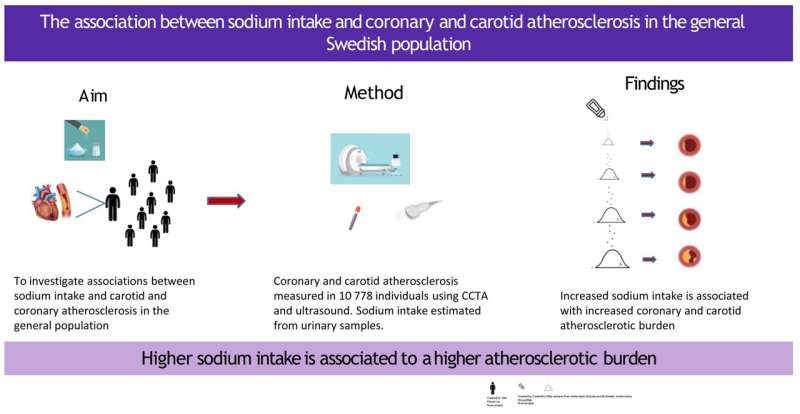This article has been reviewed according to Science X's editorial process and policies. Editors have highlighted the following attributes while ensuring the content's credibility:
fact-checked
trusted source
proofread
High-salt diet associated with hardened arteries even in people with normal blood pressure

Eating excessive salt is linked with clogged arteries of the heart and neck, which is known to be linked with raised risks of heart attack and stroke. That's the finding of a study published today in European Heart Journal Open. An editorial by Maciej Banach and Stanisław Surma referencing the study was published in the same journal.
Atherosclerosis is a narrowing of the arteries with deposits called plaque. Blood flow is impaired in arteries supplying the heart and brain with blood, raising the risks of heart attack and stroke.
"This was the first study to examine the association between a high salt intake and atherosclerosis in both the heart and neck arteries," said study author Dr. Jonas Wuopio of the Karolinska Institutet, Huddinge and Clinical Research Center, Falun, Uppsala University, Sweden. "The association was linear, meaning that each rise in salt intake was linked with more atherosclerosis. The findings applied even at normal blood pressure levels, suggesting that salt could be damaging even before the development of hypertension."
"The results reinforce the advice from the World Health Organization and other medical societies to minimize salt intake to about a teaspoon a day," he continued. "It's hard to estimate how much salt we eat, so I have two tricks to help lower consumption. One is to limit the use of table salt, as this has been linked with cardiovascular health. Number two is to replace salt, which is 100% sodium chloride, with a salt substitute containing 70%–80% sodium chloride and 20%–30% potassium chloride. Well conducted studies have shown that this approach is beneficial for heart health."
This analysis included 10,778 adults aged 50 to 64 years in the Swedish CArdioPulmonary bioImage Study (SCAPIS), the world's largest general population study assessing coronary computed tomography angiography (CCTA). Urinary sodium excretion was measured to estimate salt consumption. CCTA was used to obtain 3D images of the heart arteries for two measurements. First, the amount of calcium in the arteries, summed up as the coronary artery calcium score (CACS) in five categories (0, 1–9, 10–99, 100–399, over 399), with a higher value indicating a greater risk of myocardial infarction.
Second, obstructions (stenosis) of the heart vessels, classified as no stenosis, non-significant stenosis (less than 50% narrowing), and significant stenosis (more than 50% narrowing). Participants also had an ultrasound of the carotid arteries in the neck and were divided into three groups: no plaque, plaque in one vessel, and plaque in both vessels.
The average age of participants was 58 years and 52% were women. The researchers analyzed the association between incremental increases in salt intake and atherosclerosis after adjusting for age, sex and study site. Rising salt consumption was linked with increasing atherosclerosis in a stepwise fashion in both the neck and heart arteries. Each 1,000 mg rise in sodium excretion was associated with a 3%, 4% and 4% higher likelihood of a more serious category in the carotid plaque, CACS and coronary artery stenosis measurements, respectively.
Dr. Wuopio said, "The results show that the more salt people eat, the higher the burden of atherosclerotic plaques in the arteries of the heart and neck. The increase in blood pressure due to a high salt intake seems to be an important underlying mechanism for these findings. Interestingly, the results were consistent when we restricted our analyses to participants with normal blood pressure (below 140/90 mmHg) or to those without known cardiovascular disease. This means that it's not just patients with hypertension or heart disease who need to watch their salt intake."
More information: Jonas Wuopio et al, The association between sodium intake and coronary and carotid atherosclerosis in the general Swedish population, European Heart Journal Open (2023). DOI: 10.1093/ehjopen/oead024
Maciej Banach et al, Dietary salt intake and atherosclerosis: an area not fully explored, European Heart Journal Open (2023). DOI: 10.1093/ehjopen/oead025


















